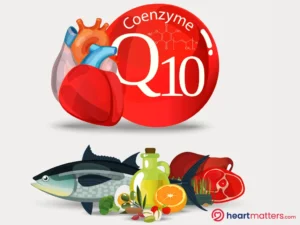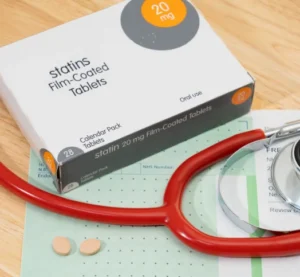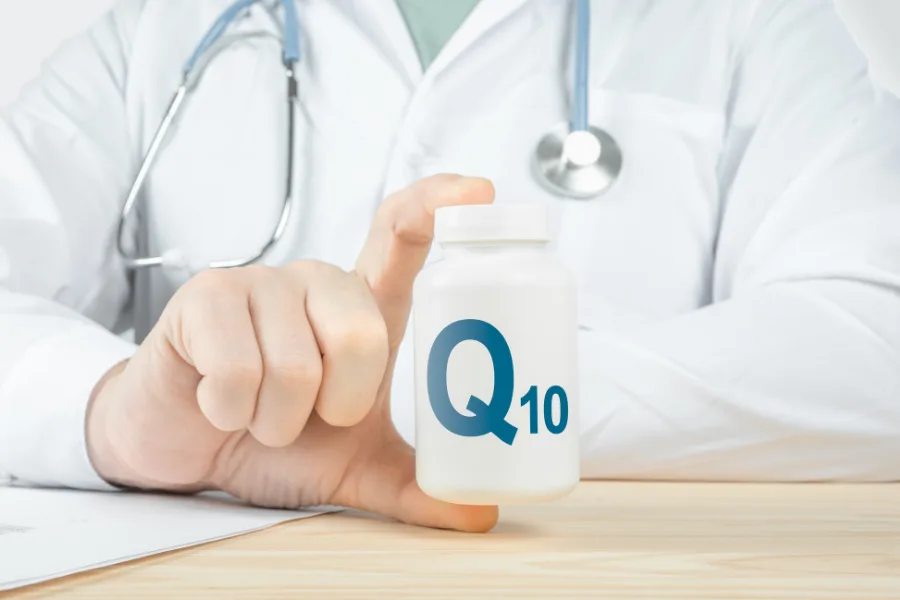Coenzyme Q10 (CoQ10) and its active form, ubiquinol, are natural compounds found in the body that play an important role in energy production and antioxidant defense. Research has recently suggested that CoQ10 and ubiquinol may also be important for heart health. In this article, we will explore the role of CoQ10 and ubiquinol in heart health and how they may benefit cardiovascular health.
The Role of CoQ10 and Ubiquinol in the Body
CoQ10 is a fat-soluble compound naturally produced in the body and found in many foods. It is involved in producing ATP, the molecule that provides energy to cells, and also functions as an antioxidant, helping protect cells from oxidative damage. CoQ10 is found in the highest concentrations in organs with high energy demands, such as the heart.
Ubiquinol is the active form of CoQ10 and is more easily absorbed and utilized by the body. It is produced through the conversion of CoQ10 in the body and is also found in some foods.

CoQ10 and Ubiquinol for Heart Health
Numerous studies have investigated the association between CoQ10 and ubiquinol levels and cardiovascular health. A meta-analysis found that supplementation with CoQ10 significantly improved left ventricular ejection fraction, a measure of heart function, in patients with heart failure. Other studies have suggested that CoQ10 and ubiquinol may help reduce inflammation and oxidative stress, which are important risk factors for cardiovascular disease.
In addition, statin medications, which are commonly used to lower cholesterol, can deplete levels of CoQ10 in the body. Supplementing with CoQ10 or ubiquinol may help to mitigate this effect and reduce the risk of statin-induced muscle damage.
CoQ10 can be obtained through the diet, primarily fatty fish and organ meats. However, obtaining enough CoQ10 and ubiquinol through diet alone can be difficult, and some individuals may require supplementation.
When choosing a CoQ10 or ubiquinol supplement, it is important to choose a high-quality product from a reputable manufacturer. CoQ10 supplements are available in ubiquinone and ubiquinol forms, with ubiquinol being the more easily absorbed and utilized form. However, ubiquinol supplements may be more expensive than ubiquinone supplements.
Evidence in Heart Failure
Coenzyme Q10 (CoQ10) has been explored as a potential adjunct to conventional medications in treating heart failure. In instances of congestive heart failure, characterized by impaired blood pumping ability, CoQ10 levels might be reduced. This condition can accumulate fluid in the lungs and legs, resulting in symptoms like shortness of breath. Clinical investigations have suggested that supplementation with CoQ10 could benefit heart failure management.
Clinical studies have indicated that CoQ10 supplements could have positive effects, including diminishing leg swelling, alleviating lung fluid accumulation for improved breathing, and enhancing exercise capacity in individuals grappling with heart failure. However, it’s important to note that the results of CoQ10 studies in this context are not uniformly positive, as some trials have not demonstrated a significant impact. Consequently, the use of CoQ10 as a remedy for heart failure remains a subject of debate.
It’s vital to exercise caution and not rely solely on CoQ10 for treating heart failure. Before considering CoQ10 supplementation for this condition, it’s advisable to consult your healthcare provider. Given the varying outcomes of studies and the ongoing discussions within the medical community, seeking professional guidance ensures that you make informed decisions about your heart failure management plan.
Evidence with high blood pressure (hypertension)
Emerging evidence suggests that Coenzyme Q10 (CoQ10) supplementation may have potential benefits for individuals with hypertension (high blood pressure). Preliminary studies have indicated that CoQ10 supplementation could help lower blood pressure, improve endothelial function, and support overall cardiovascular health in individuals with hypertension.
Numerous clinical studies with relatively small participant groups have indicated the potential of Coenzyme Q10 (CoQ10) to contribute to a reduction in blood pressure. However, it’s important to note that observable changes might take between 4 to 12 weeks to manifest. A comprehensive analysis of 12 clinical studies revealed promising results, suggesting that CoQ10 could decrease systolic blood pressure by up to 17 mm Hg and diastolic blood pressure by 10 mm Hg, all without notable side effects.
Nonetheless, it’s worth emphasizing that further research involving larger cohorts of individuals is essential to solidify these findings. It’s crucial not to attempt self-treatment for high blood pressure using CoQ10 or any other supplement. Instead, seek the guidance of your healthcare provider for appropriate treatment strategies and interventions tailored to your individual health needs.
CoQ10 and Statins
CoQ10 levels may be depleted in the body by using statin medications, commonly prescribed to lower cholesterol levels. Statins work by inhibiting an enzyme involved in cholesterol synthesis, but they also inhibit the production of CoQ10 in the body. Studies have shown that supplementing with CoQ10 may help reduce the risk of statin-induced muscle damage and improve muscle function in individuals taking statins. However, it is important to talk to a healthcare provider before taking CoQ10 supplements while on statin medications to determine the appropriate dosage and ensure that they do not interact with any other medications.
CoQ10 to reduce statin-induced muscle soreness
Using statins for managing hypercholesterolemia has proven effective in preventing cardiovascular disease. However, individuals treated with statins often experience muscle-related symptoms or myopathies. This might be partly attributed to statins inhibiting the production of coenzyme Q10, a crucial cofactor for mitochondrial energy production. A study by Caso et al published in the American Journal of Cardiology aimed to investigate whether supplementing with coenzyme Q10 would alleviate muscle pain associated with statin use.
In a double-blinded protocol, patients exhibiting myopathic symptoms were randomly assigned to receive coenzyme Q10 (100 mg/day, n = 18) or vitamin E (400 IU/day, n = 14) for 30 days. Muscle pain and its impact on daily activities were evaluated before and after treatment. Following the 30-day intervention, the group receiving coenzyme Q10 experienced a notable 40% reduction in pain severity (p < 0.001) and a 38% decrease in pain interference with daily activities (p < 0.02). In contrast, the group treated with vitamin E showed no significant changes in pain severity (+9%, p = NS) or pain interference with daily activities (-11%, p = NS).
In summary, the outcomes suggest that supplementing with coenzyme Q10 could alleviate muscle pain associated with statin treatment. This finding may present coenzyme Q10 supplementation as a viable option for addressing muscle-related side effects, allowing patients to continue their crucial statin regimen without significant discomfort.

General Advice on taking CoQ10
When considering taking coenzyme Q10 (CoQ10) supplements, following appropriate guidelines is important to ensure their safe and effective use. Here are some general instructions on how to take CoQ10 and recommended dosage information for adults:
Consult Your Healthcare Provider:
Before starting any new supplement regimen, especially if you have underlying health conditions or are taking other medications, it’s essential to consult your healthcare provider. They can advise you on whether CoQ10 is appropriate for you and what dosage is suitable based on your health profile.
Dosage Recommendations:
The optimal dosage of CoQ10 can vary based on factors such as age, health status, and the reason for supplementation. In general, daily dosages typically range from 50 mg to 200 mg. However, your healthcare provider will determine the appropriate dosage for your needs.
Formulations:
CoQ10 supplements are available in various formulations, including capsules, softgels, and tablets. You can also find CoQ10 with other ingredients, such as vitamins or minerals. Choose a formulation that suits your preferences and needs.
Timing:
CoQ10 is fat soluble, so it should be taken with a meal containing fat so your body can absorb it. Also, taking CoQ10 at night may help with the body’s ability to use it.
Consistency:
To experience the potential benefits of CoQ10, it’s important to take the supplement consistently as directed by your healthcare provider. Follow the recommended schedule.
Start Low and Gradually Increase:
If you’re new to CoQ10 supplementation, starting with a lower dose and gradually increasing it is a good practice, as advised by your healthcare provider. This helps your body adjust and minimizes the risk of potential side effects.
Monitoring:
Regularly communicate with your healthcare provider about your experience with CoQ10. They can monitor your progress, adjust the dosage if needed, and address any concerns you may have.
Quality and Safety:
Choose a reputable brand of CoQ10 from trusted sources. Look for supplements that are third-party tested for quality and potency. This can help ensure that you’re getting a reliable product.
Precautions
Interactions with Medications:
CoQ10 supplements can interact with certain medications, potentially affecting their effectiveness or causing adverse effects. If you take any medications, especially those for heart conditions, high blood pressure, blood thinners, or diabetes, consult your healthcare provider before starting CoQ10 supplementation.
Blood Thinners:
CoQ10 may have a mild blood-thinning effect. If you’re taking blood-thinning medications like warfarin or aspirin, discuss potential interactions and adjustments to your medication regimen with your healthcare provider.
Insulin and Blood Sugar Medications:
CoQ10 may affect blood sugar levels. If you have diabetes or are taking medications to manage blood sugar, consult your healthcare provider before starting CoQ10 supplementation.
Blood Pressure Medications:
CoQ10 may have a minor impact on blood pressure. If you’re on medications to manage high blood pressure, discuss potential interactions and monitor your blood pressure closely while taking CoQ10.
Chemotherapy and Radiation Therapy:
CoQ10 might interfere with certain cancer treatments. If you’re undergoing chemotherapy or radiation therapy, consult your oncologist before using CoQ10 supplements.
Pregnancy and Breastfeeding:
Limited research is available on the safety of CoQ10 supplements during pregnancy and breastfeeding. It’s advisable to avoid CoQ10 supplements during these periods unless recommended by your healthcare provider.
Surgery:
CoQ10 might affect blood clotting. If you’re scheduled for surgery, inform your healthcare provider about your CoQ10 use, as it may need to be temporarily discontinued before the procedure.
Allergies and Sensitivities:
If you have allergies, sensitivities, or known reactions to CoQ10 or related substances, consult your healthcare provider before using CoQ10 supplements.
Side Effects:
While CoQ10 is generally well-tolerated, some individuals may experience mild side effects such as stomach upset, diarrhea, nausea, or skin rashes. If you experience any unusual or severe side effects, discontinue use and consult your healthcare provider.
Dosage Considerations:
Taking excessive doses of CoQ10 may increase the risk of side effects or interactions. Always follow the recommended dosage provided by your healthcare provider or on the supplement label.
Individual Variability:
Keep in mind that individual responses to supplements can vary. What works well for one person might not be suitable for another. Your healthcare provider can help determine if CoQ10 is appropriate for you.
Consult Your Healthcare Provider:
Before starting any new supplement, consult your healthcare provider, especially if you have underlying health conditions or are taking other medications. They can provide personalized guidance based on your medical history and current medications.
Conclusion
CoQ10 and ubiquinol are natural compounds in the body that play an important role in energy production and antioxidant defense. They may also be important for heart health, as studies have suggested that supplementation with CoQ10 and ubiquinol can improve heart function, reduce inflammation and oxidative stress, and mitigate the risk of statin-induced muscle damage. While these compounds can be obtained through the diet, some individuals may require supplementation. As with any supplement, it is important to talk to a healthcare provider before taking CoQ10 or ubiquinol to ensure they are safe and appropriate for your needs.


